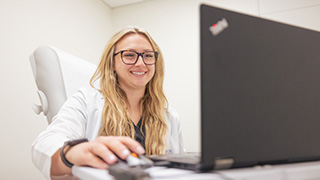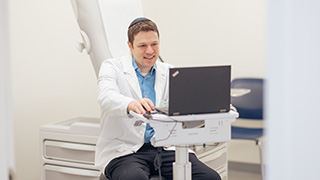Grant Elevates Training in Graduate Nursing Programs with Telehealth Simulations
Friday, December 1, 2023
This fall, College of Nursing graduate students in the nurse practitioner (NP) programs had the opportunity to learn about and engage in new telehealth technology. Through a second grant awarded by the Healthcare Foundation of New Jersey (HFNJ), "The Expansion of the Seton Hall University College of Nursing Online Nurse Practitioner Curriculum Using Innovations in Simulation," students experienced varied patient-care delivery simulations during their immersion experiences at the Interprofessional Health Sciences Campus.
"This innovative telehealth experience is the outcome of the HFNJ project which aims to further expand nurse practitioner’s education using online simulators and new telehealth technology to augment the online NP programs," said Associate Dean of Graduate Studies and Research Kathleen Neville, Ph.D., R.N., FAAN, who also serves as one of the co-principal investigators for the grant. "This pedagogical approach provides students with enhanced remote opportunities to increase technological skills in a simulated environment to prepare students for practice in complex technological healthcare systems, including telehealth services which remain highly utilized by health care systems after the COVID-19 pandemic."
Kathleen Brown, a student in the adult gerontology primary care program, shared her enthusiasm about the telehealth experience. "Doing things in a controlled environment and getting feedback right after is helpful to know how to do things better during real life experiences. I believe all students should have this experience. Times are changing, even Amazon has telehealth visits. Having this experience put us ahead of the curve."
The goal of this project is to expand technological innovations, increase student preparation and meet national NP core competencies related to this technology. Patricia Horan, also in the adult gerontology primary care program, reflected on her experience, "The telehealth program provided an opportunity to immerse ourselves in a realistic patient interaction and allowed us to gain comfort providing telemedicine services. This experience has improved my readiness to transition from student to practicing nurse practitioner."
Sixty-three graduate students from the College’s NP programs — Pediatric Primary Care, Psychiatric-Mental Health, Adult-Gerontology Acute Care and Adult-Gerontology Primary Care — engaged in the telehealth experience. Using standardized patients (actors) who presented with health concerns, students conducted patient visits remotely via telehealth. Philippe Quipot, a student in the Psychiatric-Mental Health NP program, recognizes that telehealth has become more prominent in healthcare. "This simulated experience was extremely helpful, and I appreciated the exposure and being provided with an environment where I was able to learn and practice," he said.
Some of the standardized patients that the students interacted with included case presentations involving an adult patient recently discharged from a hospital with chronic obstructive pulmonary disease, an adult diagnosed with attention deficit and hyperactivity disorder, a pediatric patient diagnosed with ankyloglossia (tongue-tied) with COVID-related parental concerns, and an adult seeking treatment for sinusitis.

Haylee Intiso, an adult gerontology primary care student, commented she now feels more confident conducting a virtual appointment with a patient.
Students were videotaped with ongoing faculty observation followed by a debriefing to review the telehealth session. "This experience allowed me to learn how to prepare for the new wave of virtual medicine in a safe, controlled environment," said Haylee Intiso, an adult gerontology primary care student. "I now feel much more confident conducting a virtual appointment with a patient."
In addition to the telehealth experience, use of the i-Human Patient Product simulators — a virtual case study software program designed to increase technological skills and practice diagnostic skills, decision-making and clinical reasoning — has been expanded to include increased numbers of graduate students and case studies during the current academic year.
Lastly, the HFNJ grant has afforded students the opportunity to practice advanced nurse practitioner skills through the purchase of arterial line and chest tube insertion equipment as well as an emergency crash cart, all equipment frequently used by nurse practitioners in acute care settings.

Adult-Gerontology Primary Care student Eric Suss reported he was "proud to be part of an institution" which is at the forefront of adapting to technological changes.
"The telehealth experience, coupled with the i-Human Patient Product simulation and equipment purchases provided by the HFNJ, significantly contribute to the College of Nursing’s delivery of state of the art, innovative education to prepare advanced practice nurse practitioners for the ever evolving, expanded roles in health care today," said Associate Professor and Co-Principal Investigator Joyce L. Maglione, Ph.D., ANP-BC, FNAP.
Adult-Gerontology Primary Care student Eric Suss added, "With modern medical needs and technology constantly changing in primary care, I'm proud to be part of an institution which is at the forefront of adapting to these changes head-on."
Categories: Health and Medicine
